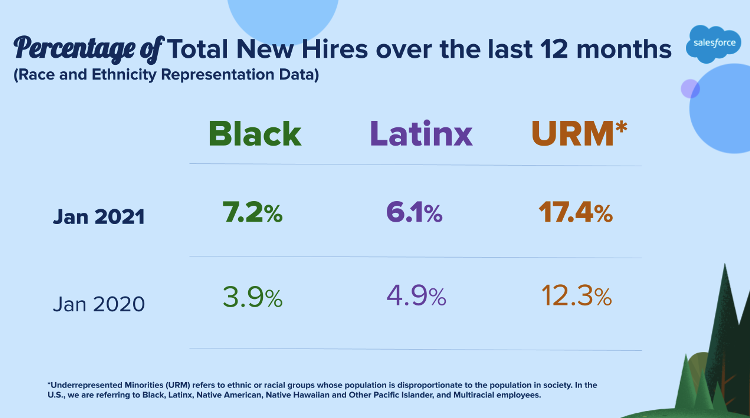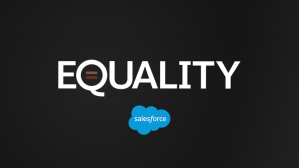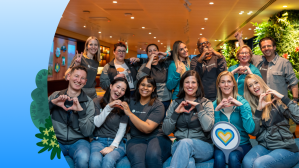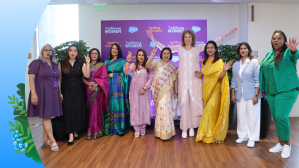This month is Black History Month and the symbolism and power of this moment seems to resonate even more deeply given everything we faced over the last year. As our society continues to grapple with the reality of racial inequality and injustice that has persisted for far too long — we all must take the time to reflect and acknowledge the work that is still ahead. We must continue to fight for and advocate for the future our ancestors believed for us. A future where we more than matter — we thrive, we are valued, and we are celebrated as Black people. This must be true from our communities to our workplaces.
As a company, we are the first to recognize that we are not there yet. There is hard work in front of us to create an environment where everyone is truly seen, heard, valued, and empowered — and a culture where everyone belongs. And we know, much like with society, it starts with holding the mirror up to ourselves. We are fallible, we all have biases, we don’t always get it right — but we are determined to lead with our values, listen deeply to our communities, and re-design our processes to begin to create the most fair and equitable experience possible, for everyone.
Over the last six months, we took on a beginner’s mindset. Shaken by the events of last spring and moved to bolder and faster action — we assembled our Racial Equality and Justice Task Force. We rigorously analyzed our representation data from hiring to promotions, elevated and empowered the community to lead, and launched programs that intentionally supported our underrepresented minorities. Today in our most recent quarterly update, we are sharing some of our early findings and learnings on this path. One place we saw immediate impact — especially after bringing our Recruiting and Equality organizations together — is hiring.
A Look at Our Hiring Data
In 2019, we announced a company goal to reach 50% of our U.S. workforce made up of underrepresented groups (Women, Black, Latinx, Indigenous, Multiracial, LGBTQ+, People with Disabilities, or Veterans) by 2023. In the summer of 2020, we added Racial Equality focused goals to double our U.S. representation of Black leaders and increase our representation of underrepresented minorities (Black, Latinx, Indigenous, and Multiracial) by 2023.
Having clear goals is not enough, we also instituted processes and strategies to reach these goals and to hold ourselves accountable. Later in this post, we’ll take a closer look at some of the strategies we’ve implemented. First, let’s review the data:
Over the past year, our percentage rate of URM hiring is up more than 40%. This includes: Black, Latinx, Indigenous and Multiracial candidates.

Seen Above: Percentage of Total New Hires Last 12 months, Race and Ethnicity Representation Data. In 2020, 3.9% Black, 4.9% Latinx and 12.3% total URM. In 2021, 7.2% Black, 6.1% Latinx and 17.4% total URM.
As depicted in the chart, for the 12 months ending in January 2020 Black candidates made up 3.9% of hires vs. 7.2% as of January 2021, Latinx made up 4.9% vs. 6.1% in 2021 and underrepresented minorities in total made up 12.3% vs 17.4% in 2021. We saw accelerated growth over the last six months and that was largely due to our newly launched inclusive hiring training and URM-focused programs (read more below).
Inclusive Hiring is Simply Hiring
Inclusive hiring at Salesforce is simply hiring. In our last quarterly update, we announced several new recruiting programs including launching our new diversity recruiting team and piloting our underrepresented minority referral program.
As the first touch point for many of our Salesforce candidates, our recruiters and sourcers underwent new training to help lead with equality at every step. These sessions help them to identify and mitigate bias throughout the interview process, evaluate candidates based on competencies, and lead with our five inclusive hiring principles.
Over the last few months, our Recruiting organization has undergone a transformation both in mindset and in our processes. We have been able to influence systemic changes that have led to immediate impact, as we can see in the data, especially around underrepresented minority hiring. Here are some of our key shifts and learnings:
- Dedicate Diversity Recruiters and Sourcers: We now have a team of fully dedicated recruiters and sourcers who spend 100% of their time reaching and engaging talent from our underrepresented minority communities. Every recruiter at Salesforce is empowered and trained to build diverse candidate slates, now leveraging the best practices of this team.
- Regularly Review Pipeline Data: Typically, every two weeks Recruiting leadership reviews our pipeline data including representation by race in the U.S. and gender globally. We review the data, identify gaps, and build tailored strategies in partnership with business leaders to ensure a fair and equitable hiring process.
- Launch Intentional URM-Focused Programs: Last summer, we launched several new URM-focused programs to engage Black, Latinx, Indigenous, and Multiracial talent to ensure a fair and equitable hiring experience. This includes our Diversity recruiting team, URM referral program, new partnership with Black and Latinx professional networks, and racial equality training.
- Build Access and Equity into Referrals: As with many tech companies, referrals are our biggest source of hires. We recognize we have to be intentional about creating access for underrepresented talent. In that spirit, we launched a URM referral program and process to increase fairness, access, and visibility for these candidates.
- Expand Competency-Based Hiring: We are broadening our training for recruiters, interviewers, and hiring managers to help lead with competency based interviewing meaning hiring based on the skills needed to be successful in that role — not the reputation of school they went to, brand name of their past company, who they know, or culture/personality fit. We use a standardized feedback tool mapping hiring decisions to core competencies to drive accountability.
- Empower the Community: One of the important steps we took was to elevate and empower the community to lead. In this post we highlight some of those who are integral to the progress we’ve made so far.
Spotlight on Employees Leading Innovation: From Hiring to Retention and Belonging
We recognize that creating a culture of equality goes beyond hiring. To truly build a workplace that looks like society, we have to focus on the experience after they enter our doors. We also know that when we solve for our most underrepresented — we can solve for all. Over the last six months we have been intentional about developing programs to support and elevate our Black, Latinx, Indigenous, and Multiracial talent while also empowering the community to lead and guide us.
We are grateful for the incredible leaders and their teams who are helping to drive change. Here are a few we’d like to celebrate:
LaToya Skinner, Director, Equality Talent Partners

“I’ve been at Salesforce for 7 years. I started as a senior recruiter supporting the marketing team. In my current role, my team and I are responsible for providing access and advocacy to the URM community to help increase representation throughout the organization.
Inclusive hiring is important to me because it allows every candidate to receive fair treatment throughout the interview process, which will lead to equal opportunity. We interview candidates and make hiring decisions based on the core competencies. This helps us make sure we hire the best person for the role and everyone has a fair and equitable interview process.”
Harry A. Colón-Morera, Manager, Diversity Recruiting & Sourcing – Americas
 “I manage the diversity sourcing team for Sales and Customer Success. My team’s job is to go out in the market and find strong qualified Black, Latinx, and Indigenous talent. We’re also providing access for candidates from all types of industries by really letting our inclusive hiring principles guide how we assess and position candidates.
“I manage the diversity sourcing team for Sales and Customer Success. My team’s job is to go out in the market and find strong qualified Black, Latinx, and Indigenous talent. We’re also providing access for candidates from all types of industries by really letting our inclusive hiring principles guide how we assess and position candidates.
Inclusive hiring is important to me because creating a company that truly reflects our society makes us stronger. I believe there’s a ton of talent in the market that has historically been overlooked and it’s important to me that we start changing that.
One very easy thing that we can do to start practicing inclusive hiring is to check our bias because we all have it.”
Jacalyn Chapman, Senior Director, Employee Advocacy and Belonging
 “I have held several roles at Salesforce over the past 9 years, but I am most excited about leading the Employee Advocacy and Belonging team. Last year we launched the Warmline, an employee advocacy program to help support and empower Women, Black, Indigenous, and LatinX employees. Employees can have confidential conversations with an advocate focused on belonging and career navigation. Our ultimate goal is to help improve the employee experience. We do that by helping employees create a path forward, informing existing programs/processes and launching innovative pilots.
“I have held several roles at Salesforce over the past 9 years, but I am most excited about leading the Employee Advocacy and Belonging team. Last year we launched the Warmline, an employee advocacy program to help support and empower Women, Black, Indigenous, and LatinX employees. Employees can have confidential conversations with an advocate focused on belonging and career navigation. Our ultimate goal is to help improve the employee experience. We do that by helping employees create a path forward, informing existing programs/processes and launching innovative pilots.
We all can help to create a sense of belonging by making space for the perspective of others, actively listening for opportunities to offer support and providing access to communities to foster connections.”
Aubree Broadwater, Recruiting and Equality Enablement Lead
 “In my role, I oversee inclusive hiring enablement for our recruiters, hiring managers, and interviews — empowering everyone to lead with equality in the interview process and create access for everyone into the opportunities at Salesforce. My commitment to support our community extends beyond my day job. For example, as the leader of BOLDforce (Our Black employee Resource Group) in Atlanta, I most recently helped to register Black voters in Georgia.
“In my role, I oversee inclusive hiring enablement for our recruiters, hiring managers, and interviews — empowering everyone to lead with equality in the interview process and create access for everyone into the opportunities at Salesforce. My commitment to support our community extends beyond my day job. For example, as the leader of BOLDforce (Our Black employee Resource Group) in Atlanta, I most recently helped to register Black voters in Georgia.
Inclusive hiring is important to me because, without it, I might not be here at Salesforce today. When we are inclusive in our practices, mindsets, and language we are able to evaluate candidates based on competencies. We do not allow our own personal biases to influence our decisions. When this is followed, we ultimately are contributing towards the overall success of the business and a stronger culture for everyone.
Lindsey Siegel, Manager, Internal Careers
 I originally joined Salesforce in 2015 as a recruiter responsible for San Francisco sales hiring. I was perplexed by the idea that folks who identify as I do, ‘didn’t exist’ and that those responsible for making the hire, didn’t feel confident in their ability to identify diverse talent. I returned to Salesforce in April 2020 with a program in mind, Career Milestones. It’s a program designed to democratize access for internal Black, Latinx, and Indigenous US-based talent through career development, 1:1 coaching, opportunities and experiences, and executive-level sponsorship.
I originally joined Salesforce in 2015 as a recruiter responsible for San Francisco sales hiring. I was perplexed by the idea that folks who identify as I do, ‘didn’t exist’ and that those responsible for making the hire, didn’t feel confident in their ability to identify diverse talent. I returned to Salesforce in April 2020 with a program in mind, Career Milestones. It’s a program designed to democratize access for internal Black, Latinx, and Indigenous US-based talent through career development, 1:1 coaching, opportunities and experiences, and executive-level sponsorship.
It’s all of our roles to create an inclusive world and workplace. I believe that if you are designing for humans, which we all are, I’d encourage you to evaluate your creation. Ask yourself, “Who have you’d designed for? Who is left out? Who did we forget?” Reimagining who we are creating for, who we are serving, gives us the opportunity to design for more, and to design for all. I believe that our liberation is intertwined and when we design for those who are often the least represented or most marginalized, it benefits us all.
Marcus Stevenson, Equality Mentorship Program Lead
 “As the Equality Mentorship Lead, I merge my passions for representation, inclusion, and broadening access to opportunities in the tech industry. My career path into tech is unconventional as I got my start at Year Up, a workforce development organization. I was so inspired by the mentorship and guidance I received along the way; I wanted to build a career around paying it forward and lifting others as I climb — especially for our most underrepresented communities at work.
“As the Equality Mentorship Lead, I merge my passions for representation, inclusion, and broadening access to opportunities in the tech industry. My career path into tech is unconventional as I got my start at Year Up, a workforce development organization. I was so inspired by the mentorship and guidance I received along the way; I wanted to build a career around paying it forward and lifting others as I climb — especially for our most underrepresented communities at work.
Through the Equality mentorship program, we provide developmental opportunities for communities of color at Salesforce. We do this by increasing access for our participants and building trusted networks and relationships. We also identify skill and development needs and meet those needs through our content journey.”
Kate Israels, Director, Talent Experience & Recruiting Programs
 “We have to make sure that our people reflect our communities around us. It’s super important to me as an ally to create access for underrepresented communities. Having an inclusive workforce promotes equal opportunities for our employees and ultimately builds stronger teams through diverse thought. If you’re a hiring manager, you have the power to build an inclusive pipeline. Ask your recruiters about their DEI (Diversity, Equity, and Inclusion) candidate strategy and make sure you’re screening a diverse panel of candidates.
“We have to make sure that our people reflect our communities around us. It’s super important to me as an ally to create access for underrepresented communities. Having an inclusive workforce promotes equal opportunities for our employees and ultimately builds stronger teams through diverse thought. If you’re a hiring manager, you have the power to build an inclusive pipeline. Ask your recruiters about their DEI (Diversity, Equity, and Inclusion) candidate strategy and make sure you’re screening a diverse panel of candidates.
If you’re a referrer (and we’re all referrers), build an inclusive network. All of us should have a professional circle that’s filled with representation. When it comes time to refer, tap into that network and help build your own inclusive workforce. It all comes down to this: diversify your social networks, network with colleagues to better understand their backgrounds, and help educate others if you are seeing any type of bias.”
Ed Delgado, Director, Global Sourcing
 “I’ve been at Salesforce for over a little over a year now and currently lead a globally distributed team of Sourcing Recruiters. Our team has the privilege of sourcing Salesforce’s future talent in a way that creates personal connections and ensures our workforce reflects our communities across the globe.
“I’ve been at Salesforce for over a little over a year now and currently lead a globally distributed team of Sourcing Recruiters. Our team has the privilege of sourcing Salesforce’s future talent in a way that creates personal connections and ensures our workforce reflects our communities across the globe.
Part of my personal mission is to improve equality in the workplace and decrease the unemployment rate. It’s essential that we continue to break down barriers to increase access to opportunities for job seekers who have been historically underserved and overlooked. Inclusive hiring establishes a fair and equitable foundation for you to identify the most qualified candidate for a job and puts you on the pathway for creating a workplace that truly reflects our society.”
Our Ongoing Commitment to Building an Inclusive Workplace
We recognize there is significant work ahead, and we remain committed to building a workplace that truly reflects society and where everyone feels seen, valued, heard, and empowered to succeed. We will continue to share progress and areas of opportunity in our next quarterly Equality update.
Learn more about our commitment to Equality and how you can join us on our path.



















